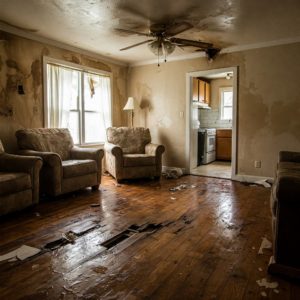10 BEST TIPS TO PREVENT WATER DAMAGE IN YOUR HOME
Water damage can wreak havoc on your home, causing structural issues, mold growth, and costly repairs. While you can’t always prevent unexpected events like burst pipes, proactive measures can significantly reduce the risk of water damage. Here are 10 essential tips to safeguard your home: 
1. Monitor Your Water Bill:
- Unexpected spikes? A sudden increase in your water bill could indicate a hidden leak.
- Investigate: Listen for dripping faucets, running toilets, or any unusual water sounds.
2. Regular Plumbing Inspections:
- Visual Checks: Regularly inspect pipes, faucets, and fixtures for signs of leaks, drips, or corrosion.
- Under-Sink Checks: Look for leaks around the pipes and connections beneath sinks.
- Appliance Inspections: Check for leaks around washing machines, dishwashers, and refrigerators with ice makers.
3. Check Supply Lines:
- Inspect for Corrosion: Look for corrosion on the metal lines connecting to fixtures.
- Test Valves: Turn supply valves on and off to ensure they operate smoothly and don’t leak.
4. Ceiling and Wall Inspections:
- Look for Signs of Leaks: Inspect ceilings and walls, especially below bathrooms, for water stains, discoloration, or musty odors.
- Check for Warping: Watch for warped flooring or baseboards, which could indicate hidden leaks.
5. Address Minor Issues Promptly:
- Fix Dripping Faucets: A persistent drip can waste gallons of water and potentially lead to more serious problems.
- Replace Worn-Out Toilets: Older toilets often have inefficient flappers, leading to constant running and water waste.
6. Maintain Your Water Heater:
- Regular Flushing: Flush your water heater annually to remove sediment buildup and prevent leaks.
- Check for Leaks: Regularly inspect for leaks around the unit and connections.
7. Insulate Pipes in Cold Climates:
- Prevent Freezing: Protect exposed pipes from freezing temperatures, which can cause them to burst.
8. Install a Water Shutoff Valve:
- Easy Access: Ensure you know the location of your main water shutoff valve and that it operates correctly.
9. Consider a Water Alarm:
- Early Leak Detection: Install a water alarm system that alerts you to leaks in specific areas, allowing for prompt action.
10. Schedule Professional Maintenance:
- Regular Inspections: Schedule regular plumbing inspections to identify and address potential problems before they become major issues.
By implementing these tips, you can significantly reduce the risk of water damage in your home, protecting your property and your peace of mind. If you suspect a leak or have concerns about your plumbing system, contact a qualified plumber for immediate assistance.
Disclaimer: This information is for general guidance only and does not constitute professional advice. Always consult with a qualified plumber for specific concerns and repairs.
Conclusion
A water leak in your home can seem like a small issue but it can cause significant damage if it’s a major leak or a burst pipe and no one is around to shut off the water. Here are some tips to help prevent a water leak in your home.
Always check your water bill
If your water bill seems to be uncharacteristically high, you may have a water leak. Listen for any sounds of dripping water from faucets or periodic refilling of your toilets water supply. None of these issues typically cause damage to your home but they can cause damage to your wallet through increased water bills. For toilets, try replacing the flapper valve located at the bottom of the tank. For faucets, installing a new o-ring or cartridge typically stops the drip.
Inspect your plumbing & fixtures
Periodically do a simple inspection of your piping and water supply lines. Look under kitchen and bathroom sinks. Make sure that the pipes are not leaking at the joints or from the bottom of the p-trap. Check around your water heater and appliances that use water like your dishwasher, refrigerator with ice maker, sinks, bathtubs, showers and toilets. Now inspect the supply lines to those same fixtures. Check for corrosion on supply line fittings and valves while checking for stains below the connections. Turn the supply lines off and on to make sure that they work properly and don’t leak when activated.
Inspect your ceilings and walls
Inspect rooms directly below any bathrooms. Look for stains on walls or ceilings or a musty smell. Look for discolored, cracked or warped flooring. If you have a basement or crawl space, check exposed drain pipes and look for signs of water leaks.
These tips can help you avoid or minimize water damage to your home. If during your periodic inspection you find any water leaks, signs of water damage, corrosion of pipes or suspect you have a water leak, call Option One Plumbing today.

